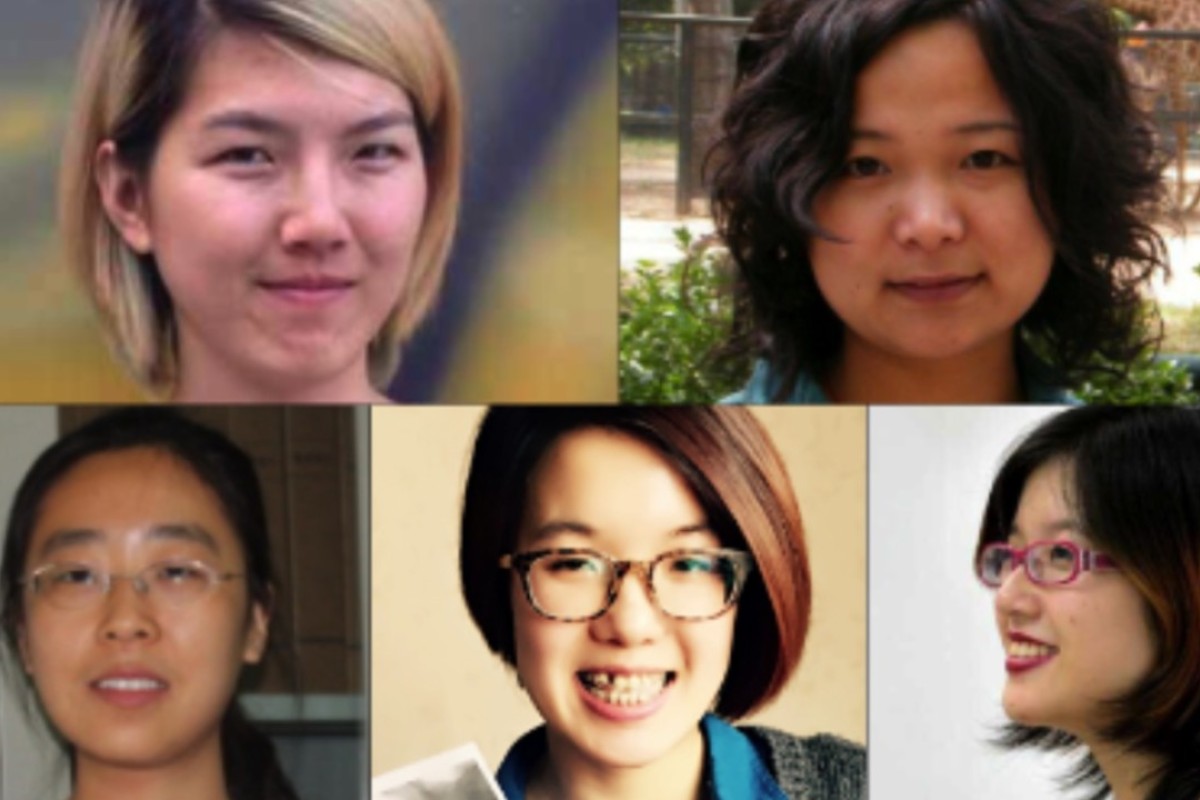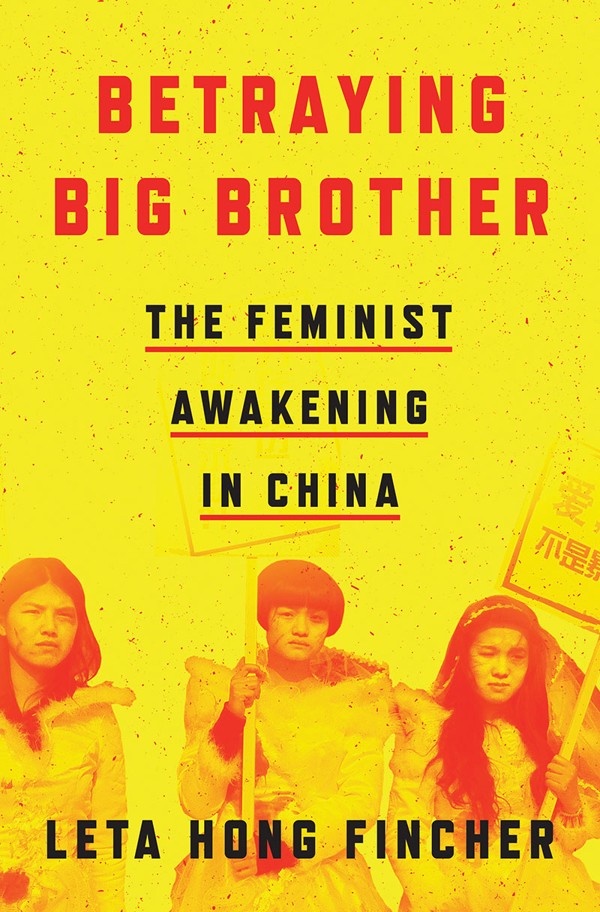Source: SCMP (9/7/18)
The rise of China’s feminists: will activists spark social change, or burn out, asks writer
Author Leta Hong Fincher considers whether China’s Feminist Five will be remembered as icons who advanced society or mere footnotes in a patriarchal state’s history
By Joyce Lau

(clockwise from top left) Li Tingting, Wu Rongrong, Zheng Churan, Wei Tingting, Wang Man. Picture: AFP
Betraying Big Brother: The Feminist Awakening in China
by Leta Hong Fincher
Verso Books
The reach of Betraying Big Brother: The Feminist Awakening in China goes far beyond its main story, of a determined group of feminist activists.
 At its core, the book is about the push and pull between a conservative government and an increasingly brazen population. It is a study of modern China – its politics and popular culture, and the dizzying rate of societal change in the digital era. While female activists serve as the heroines, a similar tale could be told of other groups working for social progress, whether in labour rights or the environment.
At its core, the book is about the push and pull between a conservative government and an increasingly brazen population. It is a study of modern China – its politics and popular culture, and the dizzying rate of societal change in the digital era. While female activists serve as the heroines, a similar tale could be told of other groups working for social progress, whether in labour rights or the environment.
Betraying Big Brother begins in March 2015, with five young women preparing to mark International Women’s Day by handing out stickers to passengers on public transport. The colourful, cartoony stickers urge women to scream if they are sexually harassed, and encourage police to chase down the perpetrators.
The women would likely have faded into obscurity among the throngs of people handing out fliers at public transport hubs. But a crackdown, launched before they could act, saw officers visit one of the women’s homes and arrest her. Police cars, sirens wailing, raced to an airport and officers detained a young mother. The resulting spark – the month-long jailing of the women – turned into a social-media wildfire.
[The fight against gender violence goes on for China’s ‘Feminist Five’]
They were branded the “Feminist Five” and the crackdown led to protests worldwide. The action, just as President Xi Jinping was planning to co-host a United Nations summit on women’s rights, was criticised by the diplomatic community. Thirty-seven days later, the women were released.
Leta Hong Fincher, the first American to receive a PhD from Tsinghua University’s Department of Sociology, conducted extensive interviews with the Feminist Five and other activists for this book. Her descriptions of their jailing give a glimpse of life behind bars. One of the Feminist Five, Wu Rongrong, was subjected to sleep deprivation, denied medical care and told that she and her child would be harmed if she did not confess. Even after the women were freed, they were followed and harassed.
Betraying Big Brother, an Orwellian reference to government control, traces the most recent wave of Chinese feminism as it took advantage of domestic social media such as Weibo and WeChat, starting in 2010. Online platforms such as “Feminist Voices”, founded in 2011 and closed down this year, were influential among the activist community. But more interesting are the voices that reached the general public.
One such was that of social media star Li Yuan, a divorcee working for the Wall Street Journal’s Chinese website. She depicted herself as a proudly single, modern working woman without children. Her channel included photos of her solo overseas trips and witty quips about how husbands should cook breakfast. She was hardly a radical feminist – and, in fact, resisted using the term “feminist” for some time. Still, some of her posts were blocked and her Weibo followers were capped at 2.4 million.
Censors started playing a cat-and-mouse game with increasingly outspoken women. According to Hong Fincher, Weibo banned new accounts using the term “feminist” in 2016. When the #MeToo hashtag went viral worldwide last year, after allegations by Hollywood actresses, it also became popular among Chinese women, particularly on university campuses. Hundreds of #MeToo posts were taken down, but Chinese netizens, known for their clever plays on words, created the alternative hashtag #RiceBunny, pronounced “mi-tu”, instead.
Hong Fincher observes how feminist thought is entering mainstream Chinese society, especially online and in pop culture. Images of strong girls and women are increasingly used in comic books, cosmetics adverts, films and fashion. She also chronicles the arrival of androgynous pop stars such as Chris Lee and Acrush, an all-female outfit who brand themselves as a “boy band”.
Even The Feminist Five made a music video, for A Song for All Women – sung out of tune to the melody of Do You Hear the People Sing? from the musical drama Les Miserables. In part spoof, with the women joking and smiling while posing on beaches and in gardens, it also has a serious message about the consequences of their activism, as they describe lost jobs and restricted travel.Many of China’s feminist activists have been shaped by traumatic experiences, from childhood abuse to homophobic bullying. Hong Fincher paints a picture of an unequal society in which girls are harassed by school officials, and women are assaulted in workplaces and at home. According to government sources, up to one in four married women have been beaten by their spouse. The first nationwide law against domestic violence came into force only in 2016.One of the Feminist Five, Li Tingting (also called Li Maizi) had run away in her youth after her abusive father came after her with a knife. He had beaten his wife and children the same way his father had beaten him and his mother.Li learned to be more forgiving of her father when she was jailed in 2015 and he became enraged at the treatment of his daughter. She blames her father’s violent nature on his upbringing and society’s expectations.

Writer Leta Hong Fincher.
In a brief but deeply disturbing section, Hong Fincher describes her own sexual assault as a young woman in Australia. She discloses how, as a confused teenager, she initially blamed herself and kept quiet for many years. Her own trauma highlights how the fight for equality often stems from deep-rooted, personal injustices – and also that this is a world problem, not just China’s.
Betraying Big Brother is a meticulously sourced work by an academic, but the author also makes observations and describes her feelings of warmth, worry, friendship and admiration for her subjects.
Hong Fincher, also the author of Leftover Women: The Resurgence of Gender Inequality in China (2014), is a well-known feminist and government critic and writes that “China’s male rulers see gendered opposition as crucial for the future of their dictatorship.” She urges resistance against the patriarchy.
She makes a strong argument that better treatment of the 650 million women in China – and by extension women all over the world – is crucial to development. Their equality in education, work and the freedom of expression will have enormous consequences for society.
The basic right to go about your daily life – to love who you want and say what you feel without harassment or abuse – is universally understood. And China’s feminists have received broad support.
“The feminist resistance may yet have the potential to become China’s most transformative movement in the long run – provided that any social movement is allowed to exist,” she writes.
That is a big caveat, given the level of state control over grass-roots movements. A generation from now, the Feminist Five could be remembered as rebellious icons who changed society. Or they may be a footnote in history.
Hong Fincher, at least, is betting on their staying power. She concludes that “China’s Feminist Five have become a kind of incandescent myth, soaring like the legendary bird Jingwei, determined – no matter how long it takes – to fill the sea.”